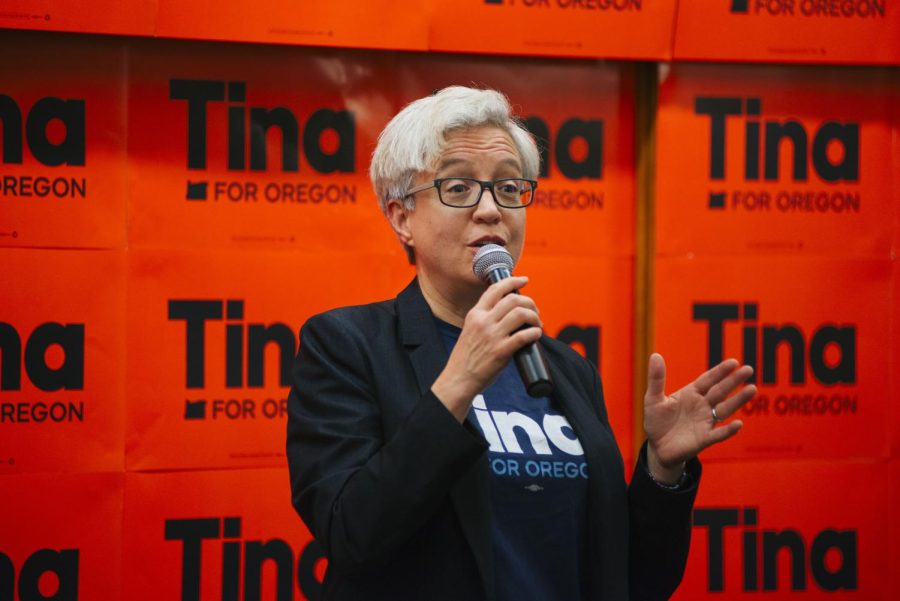What changes can Oregonians expect from incoming governor Tina Kotek?
Democratic candidate for Governor of Oregon, Tina Kotek speaks to a crowd of students and community members at the Oregon State Memorial Ballroom on Oct. 24 in Corvallis Kotek answered questions from students addressing multiple pertinent issues including abortion access and climate change
November 28, 2022
Oregonians have elected Tina Kotek to be their next governor, and the governor-elect will face several policy challenges, from houselessness to education and healthcare issues.
Kotek, a Democrat, defeated Republican challenger Christine Drazan and Independent candidate Betsy Johnson. Kotek served as speaker of the house in the Oregon Legislature until January.
Kotek, who joins Massachusetts Governor-Elect Maura Healy as the nation’s only openly lesbian governors, replaces term-limited Democrat Kate Brown.
“I think much of the policy content will be similar to the Brown Administration, but Kotek’s governing style will differ,” said Benton County Commissioner Xanthippe Augerot. “I hope that Kotek will forge public-private partnerships, and work to incentivize the private sector to help meet policy goals.”
Healthcare changes
Commissioner Augerot expects major changes in leadership across state agencies, particularly the Oregon Health Authority.
“That may slow down the delivery of essential funding streams for county services,” Augerot said. “But may lead to better local-state partnerships down the road.”
One area that needs better state-county communication is public health and mental health services, Augerot says.
“Over my past six years in office, the Governor and Legislature have often not taken county capacity and service delivery systems into account,” Augerot said. “‘One size fits all’ policies and funding mechanisms…simply don’t work for us in Benton County.”
However, the state has improved in some areas of healthcare over the past decade.
The number of Oregonians with health insurance rose from 85.4% in 2011 to 95.4% in 2021, according to Chunhuei Chi, director of Oregon State University’s Center for Global Health and a professor in OSU’s College of Public Health and Human Sciences.
Oregon expanded Medicaid coverage through the Oregon Health Plan to achieve this, Chi said. According to Chi, Kotek supported the expansion of the OHP as a legislator, which extended coverage to approximately 100,000 Oregonians.
“I am confident that she will put more focus on OHP to achieve her health priorities,” Chi said.
According to the Kotek campaign’s website, Tina for Oregon, Kotek’s priorities include reducing the number of Oregonians without health insurance.
Oregon’s uninsured rate in 2021 was 4.6%, according to Chi. In 2021, the uninsured rate was 6.6% in the 36 states that have expanded Medicaid coverage, of which Oregon is one, and 12.7% in states that hadn’t, with a national average of 8.3%.
“This is a very remarkable achievement,” Chi said. “Oregon was doing much better than most states.”
According to Chi, Oregon’s public health systems, another area of focus Kotek, have had several weaknesses exposed in them.
“The structural challenge that most states’ public health systems…face is systematic underfunding in public health, which leads to the under-development of public health infrastructure,” Chi said.
The Kotek campaign has also stated that Kotek intends to increase access to healthcare in rural Oregon communities.
“On average, the rural populations in most communities have poorer health…which translates into greater health promotion and healthcare needs,” Chi said. “At the same time, they also face a lower level of financial…and geographical access to healthcare.”
The passage of Oregon Measure 111, which amends the Oregon Constitution to require the state ensures access to affordable healthcare, presents another significant challenge for Kotek.
Houselessness and mental health
According to her campaign, Kotek also plans to expand mental health and substance abuse services statewide. In particular, Kotek supports improving access to these services for Oregonians experiencing houselessness, a policy that Andrea Myhre, Executive Director of Corvallis Housing First, thinks is an important measure.
Myhre said it would be important for Kotek to “continue to support more funding and better systems for mental health, substance use treatment, residential treatment options, affordable housing and shelter funding.”
Myhre says that Oregon lawmakers have taken steps to counter houselessness, including increasing funding for affordable housing and shelters, but also that state support for innovative strategies and policies is important.
“Supporting more innovative approaches like Project Turnkey will be important,” Myhre said.
Project Turnkey is an ongoing statewide plan to convert unused motels and hotels in shelters for unhoused Oregonians. The project began in 2020, when the Oregon Legislature allocated $65 million in state funding to the effort, according to a 2021 press release from the Oregon House Democrats.
Kotek supported the project as speaker of the house, her campaign says.
Education
Kotek also intends to make changes to Oregon’s education system, reducing standardized testing in favor of “real-time assessments to monitor student learning” and requiring high school students complete courses on financial literacy and life skills.
“Governor-Elect Kotek’s educational priorities are good,” said Corvallis School Board Chair Sarah Finger McDonald. However, McDonald has concerns about the state’s education policies.
“We need to change how we ask school districts to fund facilities improvements,” McDonald said. “We’re lucky in Corvallis that our community supported a bond so we could rebuild and renovate our schools… other districts where bonds do not pass or where they have a small tax base are not able to improve their school facilities.”
According to McDonald, this could be alleviated with state grants and funding, something Kotek may be amenable to.
“I have heard Gov. Elect Kotek touch on this issue when she talks about education,” McDonald said. “I hope she recognizes facility improvements are part of the way we support students.”
Another education goal of the Kotek campaign is raising statewide graduation rates to 90% by 2027.
“I think this is feasible,” Mcdonald said. “I’d like the goal to be graduating 100% of our students.”
According to McDonald, Corvallis students have benefited from summer programs, which don’t currently receive separate funding from the state.
“School districts need permanent funding of summer programming separate from the school general fund,” Mcdonald said. “I asked Governor-Elect Kotek about funding summer programs…and she expressed strong support.”












































































































